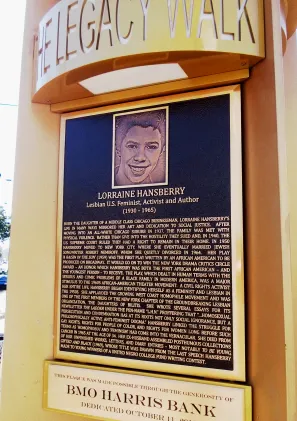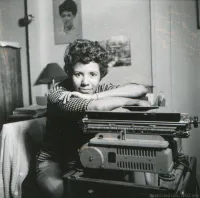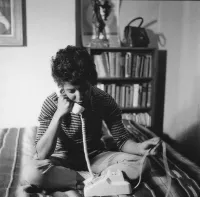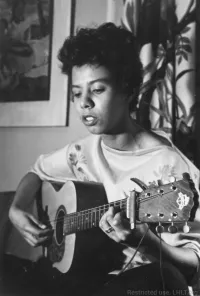Biography
1930 - 1965
"A status not freely chosen or entered into by an individual or a group is necessarily one of oppression and the oppressed are by their nature (i.e., oppressed) forever in ferment and agitation against their condition and what they understand to be their oppressors. If not by overt rebellion or revolution, then in the thousand and one ways they will devise with and without consciousness to alter their condition"
- Lorraine Hansberry
Born the daughter of a middle class Chicago businessman, Lorraine Hansberry’s life in many ways mirrored her art and dedication to social justice. After moving into an all-white Chicago suburb in 1937, the family was met with physical violence. Rather than give into the hostility they sued and, in 1940, the U.S. Supreme Court ruled they had a right to remain in their home. In 1950 Hansberry moved to New York City, where she eventually married Jewish songwriter Robert Nemiroff, whom she quietly divorced in 1962. Her play ‘A Raisin in the Sun’ (1959) was the first play written by an African American to be produced on Broadway. It would go on to win the New York Drama Critics Circle Award – an honor which Hansberry was both the first African American – and the youngest person – to receive. The play, which dealt in human terms with the serious and comic problems of a black family in modern America, was a major stimulus to the 1960s African-American Theater movement. A civil rights activist her entire life, Hansberry began identifying herself as a feminist and lesbian in the 1950s. She applauded the growing West Coast homophile movement and was one of the first members of the New York chapter of the groundbreaking lesbian organization, the Daughters of Bilitis. She wrote several essays for its newsletter The Ladder under the pen-name “L.H.N.” proffering that “…homosexual persecution and condemnation has at its roots not only social ignorance, but a philosophically active anti-feminist dogma.” Hansberry linked the struggle for gay rights, rights for people of color, and rights for women long before such terms as ‘homophobia’ and ‘feminism’ had come into the vernacular. She died from cancer in 1965 at the age of 34. Her ex-husband assembled posthumous collections of her unfinished works, letters, and diary entries – most notably To Be Young Gifted and Black (1969), whose title was drawn from the last speech Hansberry made to young winners of a United Negro College Fund writing contest.
1930 - 1965
"A status not freely chosen or entered into by an individual or a group is necessarily one of oppression and the oppressed are by their nature (i.e., oppressed) forever in ferment and agitation against their condition and what they understand to be their oppressors. If not by overt rebellion or revolution, then in the thousand and one ways they will devise with and without consciousness to alter their condition"
- Lorraine Hansberry
Born the daughter of a middle class Chicago businessman, Lorraine Hansberry’s life in many ways mirrored her art and dedication to social justice. After moving into an all-white Chicago suburb in 1937, the family was met with physical violence. Rather than give into the hostility they sued and, in 1940, the U.S. Supreme Court ruled they had a right to remain in their home. In 1950 Hansberry moved to New York City, where she eventually married Jewish songwriter Robert Nemiroff, whom she quietly divorced in 1962. Her play ‘A Raisin in the Sun’ (1959) was the first play written by an African American to be produced on Broadway. It would go on to win the New York Drama Critics Circle Award – an honor which Hansberry was both the first African American – and the youngest person – to receive. The play, which dealt in human terms with the serious and comic problems of a black family in modern America, was a major stimulus to the 1960s African-American Theater movement. A civil rights activist her entire life, Hansberry began identifying herself as a feminist and lesbian in the 1950s. She applauded the growing West Coast homophile movement and was one of the first members of the New York chapter of the groundbreaking lesbian organization, the Daughters of Bilitis. She wrote several essays for its newsletter The Ladder under the pen-name “L.H.N.” proffering that “…homosexual persecution and condemnation has at its roots not only social ignorance, but a philosophically active anti-feminist dogma.” Hansberry linked the struggle for gay rights, rights for people of color, and rights for women long before such terms as ‘homophobia’ and ‘feminism’ had come into the vernacular. She died from cancer in 1965 at the age of 34. Her ex-husband assembled posthumous collections of her unfinished works, letters, and diary entries – most notably To Be Young Gifted and Black (1969), whose title was drawn from the last speech Hansberry made to young winners of a United Negro College Fund writing contest.
Lesson Plan
Please login or register for an account to view this lesson plan.
Demography
Demography
Gender Female
Sexual Orientation Lesbian
Gender Identity Cisgender
Ethnicity African American Black
Faith Construct Atheist
Nations Affiliated United States
Era/Epoch Civil Rights Movement (1954-1968) Cold War (1945-1991)
Field(s) of Contribution
Advocacy & Activism
Art, Music, Literature & Theater
Film
Journalism
Media & Communications
Social Justice
Social Sciences
Theater
US History
Commemorations & Honors
First African American Playwright and Youngest Person to Win the New York Drama Critics Circle Award for A Raisin in the Sun (1959)
Tony Award Nominee for A Raisin in the Sun (1960)
Lorraine Hansberry Theatre of San Francisco Founded (1981)
Posthumous Chicago LGBT Hall of Fame Inductee (1999)
Scholar Molefi Kete Asante Named Hansberry of the 100 Greatest African Americans (2002)
Posthumous Chicago Literary Hall of Fame Inductee (2010)
Posthumous American Theatre Hall of Fame Inductee (2013)
Posthumous National Women's Halls of Fame Inductee (2017)
Demography
Gender Female
Sexual Orientation Lesbian
Gender Identity Cisgender
Ethnicity African American Black
Faith Construct Atheist
Nations Affiliated United States
Era/Epoch Civil Rights Movement (1954-1968) Cold War (1945-1991)
Field(s) of Contribution
Advocacy & Activism
Art, Music, Literature & Theater
Film
Journalism
Media & Communications
Social Justice
Social Sciences
Theater
US History
Commemorations & Honors
First African American Playwright and Youngest Person to Win the New York Drama Critics Circle Award for A Raisin in the Sun (1959)
Tony Award Nominee for A Raisin in the Sun (1960)
Lorraine Hansberry Theatre of San Francisco Founded (1981)
Posthumous Chicago LGBT Hall of Fame Inductee (1999)
Scholar Molefi Kete Asante Named Hansberry of the 100 Greatest African Americans (2002)
Posthumous Chicago Literary Hall of Fame Inductee (2010)
Posthumous American Theatre Hall of Fame Inductee (2013)
Posthumous National Women's Halls of Fame Inductee (2017)
Resources
Resources
Bond, Jean Caron, ed. Lorraine Hansberry: Art of Thunder, Vision of Light. A special issue of Freedomways Magazine 19.4 (1969).
Chene, Anne. Lorraine Hansberry. Boston: Twayne, 1984.
Hansberry, Lorraine. Letters to The Ladder 1.11 (August 1957): 26-30. Signed "LNN." Quoted in Jonathan Katz. Gay American History: Lesbians and Gay Men in the U.S.A. New York: Thomas Y. Crowell, 1976.
Hansberry, Lorraine. "A Raisin in the Sun" and "The Sign in Sidney Brustein's" Window. New York: New American Library, 1966.
Hansberry, Lorraine. To Be Young, Gifted and Black: Lorraine Hansberry in Her Own Words. Adapted by Robert Nemiroff. New York: New American Library, 1970.
Marre, Diana. "Lorraine Hansberry." Notable Black American Women. Jessie Carney Smith, ed. Detroit: Gale Research, 1992. 452-457.
Perry, Imani. Looking for Lorraine: The Radiant and Radical Life of Lorraine Hansberry. Boston: Beacon Press, 2019.
Wilkerson, Margaret B. "Excavating Our History: The Importance of Biographies of Women of Color." Black American Literature Forum 24 (1990): 73-84.
http://chicagolgbthalloffame.org/hansberry-lorraine/
http://www.theroot.com/lorraine-hansberrys-gay-politics-1790869060
http://outhistory.org/exhibits/show/lorraine-hansberry/lesbian-writing
Resources
Bond, Jean Caron, ed. Lorraine Hansberry: Art of Thunder, Vision of Light. A special issue of Freedomways Magazine 19.4 (1969).
Chene, Anne. Lorraine Hansberry. Boston: Twayne, 1984.
Hansberry, Lorraine. Letters to The Ladder 1.11 (August 1957): 26-30. Signed "LNN." Quoted in Jonathan Katz. Gay American History: Lesbians and Gay Men in the U.S.A. New York: Thomas Y. Crowell, 1976.
Hansberry, Lorraine. "A Raisin in the Sun" and "The Sign in Sidney Brustein's" Window. New York: New American Library, 1966.
Hansberry, Lorraine. To Be Young, Gifted and Black: Lorraine Hansberry in Her Own Words. Adapted by Robert Nemiroff. New York: New American Library, 1970.
Marre, Diana. "Lorraine Hansberry." Notable Black American Women. Jessie Carney Smith, ed. Detroit: Gale Research, 1992. 452-457.
Perry, Imani. Looking for Lorraine: The Radiant and Radical Life of Lorraine Hansberry. Boston: Beacon Press, 2019.
Wilkerson, Margaret B. "Excavating Our History: The Importance of Biographies of Women of Color." Black American Literature Forum 24 (1990): 73-84.
http://chicagolgbthalloffame.org/hansberry-lorraine/
http://www.theroot.com/lorraine-hansberrys-gay-politics-1790869060
http://outhistory.org/exhibits/show/lorraine-hansberry/lesbian-writing








